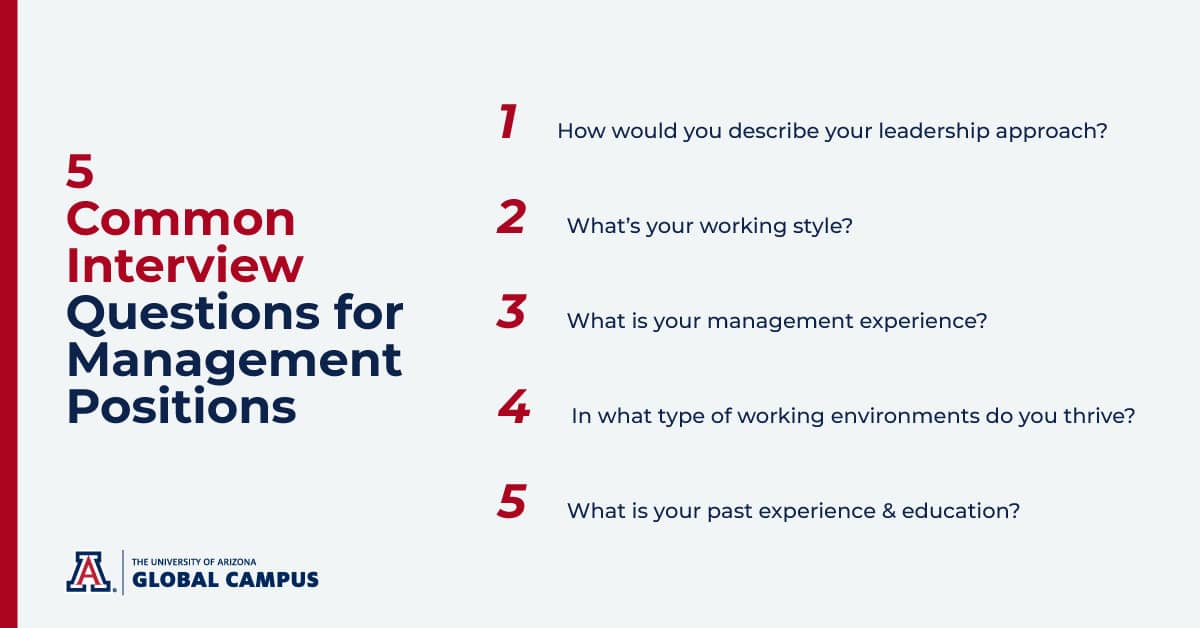Applying for jobs can be an overwhelming process. Scouring job listings, making resume updates, drafting personalized cover letters, coordinating references – it’s a job in and of itself! However, even when your initial hard work pays off and you land that interview opportunity, the effort doesn’t stop there. Studying up and preparing for common job interview questions is essential to make you stand out as a candidate and show that you really know your “stuff.” This preparation goes for any job interview, but when you’re looking to land a new position further up the organizational chart – say, when you’re applying to management-level positions – making that good first impression and avoiding mistakes becomes even more essential.
Common Job Interview Questions
When interviewing for a management-level position, you will likely need to highlight a different set of skills than in previous interviews for more entry-level positions. Many hiring personnel work off of a standard set of interview questions their corporation has outlined in order to assess an applicant’s experience, personality, and fit for the role. Keep reading to learn the typical question themes to expect, and how to prepare for them.
5 Common Interview Questions for Management Positions
Common interview questions for managers are often similar to these below.
- How would you describe your approach to leadership?
- What is your working style?
- What kind of management experience do you have?
- In what type of working environments do you thrive?
- Do you have experience or education in this role/sector/vertical?

Depending on what interviewing process the potential employer follows, you may have to go through a series of interviews with a variety of team members. Often, an initial interview with a representative from Human Resources (HR) or the hiring department is conducted by phone to assess if your qualifications align with the role. This first step is then followed by an in-person (or video call) interview by team members you would work more closely with or possibly manage. These interviews may be one-on-one or conducted as a panel. To best prepare yourself, you may want to ask the HR representative during your initial screening on what to expect out of subsequent interviews.
If you do move on to additional interviews, it is best to prepare for a series of questions aimed at trying to uncover your personal attributes, skill level, capability to adapt, ability to lead team members, and cultural fit.

1. How would you describe your approach to leadership?
This question may be phrased in different ways, but the ultimate goal is to understand how you would fit within a company’s structure. What might others expect if you should become a manager on their team? There is no one right answer to this question, and you should spend time thinking about how you interact with team members – both as peers and subordinates. As you prepare your answers, consider the following questions and be ready to answer them.
- How “hands-on” of a manager are you?
- How do you support an underperforming team member?
- Can you provide examples of when you have had to deliver negative feedback?
- What strategies do you use to motivate your team?
- What’s your approach to delegating work to employees? How do you ensure that tasks are completed?
- It is best to come with real-world examples whenever possible. If you don’t have previous management job experience, think about examples from your time at school, volunteer work, or other work examples that may relate.

2. What is your working style?
Questions about your individual working style help a company determine if your approach to day-to-day tasks will align with their company and the business setting. Consider preparing examples for questions like:
- Do you describe yourself as an organized person?
- When is the last time you missed a deadline? Why did this happen?
- How would you describe your top three strengths related to work? What are your three biggest areas that have room for improvement?
- How do you deal with stressful situations?
Remember, like all interview questions, there are no right answers, and employers understand each person is different – and human! We all get stressed and occasionally have a misstep at work. What these interview questions aim to uncover is how you are able to handle these situations. Are you able to overcome stress by taking a quick walk around the block? Can you speak to the reasons a deadline was missed calmly and in a way that doesn’t place blame? If an interviewer can see your dedication to the job and willingness to do your best, they will understand how you handle yourself in the workplace.

3. What kind of management experience do you have?
A leader and a manager can be seen as different things – which is why interviewers may focus on these questions more during management-level interviews. Do you approach management as leading a team by example or by keeping people on task? Giving examples to the following will help the company understand more about your approach.
- Describe a project you successfully managed end-to-end. What challenges did you face and what did you do to overcome them?
- What would you suppose your subordinates feel are your strengths and shortcomings as a manager, from their point of view?
- Do you follow any performance management systems?
Don’t be thrown by duplicate or probing questions. Stay confident in your approach and be sincere about your management background. If you don’t have professional management experience, try and equate the experience you do have in other applicable ways.

4. In what type of working environments do you thrive?
These questions are just as much for you as they are for the company. You should feel comfortable at your place of work, and ensuring that the company’s working style aligns with yours will allow for a longer-lasting professional relationship. Common questions to determine cultural fit may include:
- Do you prefer to work in groups or alone?
- Describe the work environment or culture in which you have experienced the most success.
- Are you social at work or tend to keep to yourself?
This part of the interview is also a good time to ask questions you may have about the role. Do your homework to understand as much as you can about the company and position before the interview, and ask questions that help you understand if this role will be one you will enjoy coming to every day.

5. Do you have experience or education in this role/sector/vertical?
At the end of the day, it’s essential for the interviewer to understand if you will be able to satisfy the job functions of the management role you applied for. To best prepare for these questions, be sure to thoroughly read the job posting and come prepared to speak to how you can perform each job function they are seeking. It’s fine if you don’t have experience in everything they are asking for, but look to have strong examples for at least 70% of the duties listed. For those remaining, show how your educational background provides the foundation to meet these requirements, and speak to how you are willing to learn to become more competent in these skills.
If you’re still unsure about having all the skills or education needed to fill a management role, consider working toward adding additional education to your resume. Not only will a bachelor’s or master’s degree help your resume stand out, there are many online degrees and classes focused on building management skills at both the undergraduate and graduate levels. By researching an online college, like the University of Arizona Global Campus, you can begin fitting courses into your daily schedule – even while out interviewing for that next position! Not sure where to start? Try our online degree finder to get going.
